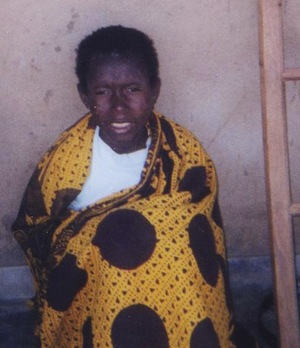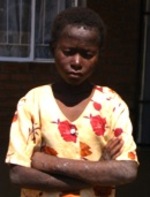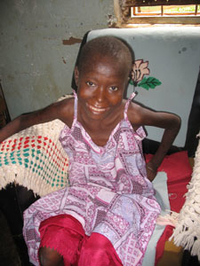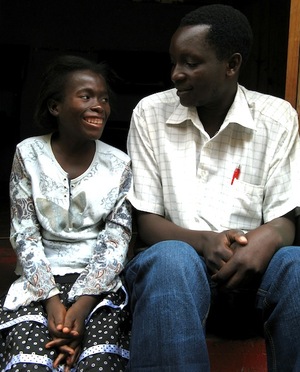In the wake of allegations that "Three Cups of Tea" author Greg Mortenson lied about his story, his charity's operations, and the misuse of donations -- coupled with Madonna's school in Malawi being nixed after $3.6 million was spent -- I feel small nonprofits like my own will suffer the most.
We get by with a team of volunteers, a shoestring budget, determination, and a whole lot of trust. There's trust from the people and communities we're supporting. There's trust from our donors who want their donations to be catalysts for improving people's lives. And there's trust in ourselves that we're being honest.
The public gives lots of money to charity, and in light of what's making the news this year, I don't blame anyone who feels enough is enough. Why trust charities? Why not give your money to the man sitting with a sign on the sidewalk -- you know where your money's going, and you probably don't have great expectations on how your goodwill will change the world.
Charity From Three Cups of Bitter Tea
Small nonprofits can easily go under if funding becomes scarce. And it's hard enough in good times to fundraise. In order for any nonprofit to get your donations, we must gain your trust. To do that, nonprofits often say what people like to hear, which is that we're saving lives, giving girls education, expanding human rights, implementing income-generating activities that make everyone freer, richer, and happier.
But charity doesn't work like that. In my experience with impoverished communities in Malawi and Cambodia, sustainable, deep-rooted change arises from recognizing three things -- my three cups of tea. This tea is bitter, because, well, it's just not sweet. Maybe it's because we learned them the hard way.
Cup of Bitter Tea #1. Money where there's no money is a risky venture.
Cup of Bitter Tea #2. Education where there's no education may not be so great.
Cup of Bitter Tea #3. Trust where trust has been built can suddenly shatter beyond repair.
I've written about bitter tea #1 & #2 in previous posts, so I'll just briefly summarize them here.
Money Where There's No Money
In places with no money -- where wages are less than a dollar a day -- money can spawn jealousy, corruption, and mistrust. Bigger grants also mean bigger projects, with bigger problems. If the goal is for a community to become self-sustaining, it's a longer road to $0 if you start with larger grants. Smaller grants means a community is less likely to become dependent on outside help, and so it may be easier for them to wean themselves off support.
Education Where There's No Education
I get in trouble for this one, so let me be clear -- I'm 100 percent for learning. Education in the U.S. means schools, diplomas, an upward motion through university. In places where a great many people, young and old, don't read or write, it's not feasible to build schools in each of the thousands of impoverished villages. In any event, youth couldn't adhere to school schedules when seasonal farm work must take precedence.
Education is a vehicle for learning, much like religion is a vehicle for faith. Before you introduce cars, you need roads. Before you bring education, a community must be able to handle money and to take responsibility for a project. Priority #1 is to prepare the community to receive a grant. After that, you can start to think about introducing learning opportunities. 
The Privilege of Trust
In an unlit corner of a mud hut near Lilongwe, Malawi, we could barely see Gladys under a dirty blanket. She's very, very bad, her uncle kept repeating. And indeed, there was this orphan, perhaps 15 years old, who was starving, had high fever, open sores, a cough you knew was a sign of TB. She didn't utter a sound, and her eyes were dull. A visiting doctor with us treated her for acute malaria, which can kill in a matter of hours. Now we had to get her tested for HIV in order for her to receive any further medical help.
Mike, who carried her on his back out of the hut, and I were frustrated. The clinic demanded the uncle give consent for Gladys to receive HIV testing, and he wouldn't do this. Gladys will  die, we pleaded with him, but he wouldn't consent. (Ask me in person why I think consenting was so hard for him.) We begged the clinic, and finally they said that they'd make an exception if Gladys consented and signed the form. Gladys had given no reaction to us of any kind, and we doubted she knew how to write. I kept arguing with the clinic, and Mike kept trying to convince the uncle.
die, we pleaded with him, but he wouldn't consent. (Ask me in person why I think consenting was so hard for him.) We begged the clinic, and finally they said that they'd make an exception if Gladys consented and signed the form. Gladys had given no reaction to us of any kind, and we doubted she knew how to write. I kept arguing with the clinic, and Mike kept trying to convince the uncle.
Suddenly, a murmur came out of Gladys. "Test me," she whispered. And she made a slash mark with a pen, and that started a whole series of testing, treatment, clinics, doctors, and hospital stays.
Gladys Teaches Us About Trust
For nearly 8 months, Gladys hovered between life and death, waging war against TB, HIV, meningitis, malaria, huge festering sores, and malnutrition. She never said more than a few words to anyone, and her eyes remained lifeless. Mike kept at it, talking to her, showing her we cared, asking her to trust us. Up to then, I'm very sure that Gladys didn't trust me, or Mike. Perhaps she hadn't trusted anyone for a very long time.
One day, we visited Gladys in the hospital, and as usual, she was a round lump under thin sheets. And then came that moment -- the moment when out of that disheveled bed arose a girl, and it was Gladys. She hugged each one of us. She beamed. And we knew that she now  trusted us, and that was a most valuable privilege. (Right: Gladys the day she first smiled)
trusted us, and that was a most valuable privilege. (Right: Gladys the day she first smiled)
Fast forward several years. Gladys overcame several health setbacks, attended school for the first time, and managed to skip a few grades. Still, at age 20, she's only in 8th grade and hasn't passed her exams to enter secondary school. She tells us she wants to be a doctor, for she thinks how nice everyone was to her when we didn't know whether she'd make it or not. Open about her HIV status, Gladys has become a very nice young woman who seems to have come to some sort of peace with her past. Gladys is beginning to see a happy future for herself.
But because she trusts us, we know we cannot -- we must not -- make promises that we can't keep. If we had the funds, we might send her to boarding school, where she would get personal academic attention. If we had the funds, we might hire a fulltime tutor for Gladys. If we had a university fund, we might tell her that if she passed four more years of exams, she might get into medical school. But we don't have any of those extra funds.
When foreigners visit our projects, I tell them I hope they interact with the local adults and youth -- but please, I tell them, don't say you'll come back if you're not absolutely sure you will.
Our donors have entrusted us to use their donations to help as many orphans as possible. Because we have other orphans to think about, we can't say to Gladys that education will always be available to her. We can't promise Gladys that she can become a doctor, or even a nurse. We can't even promise her that she'll finish secondary school. Saying so would be breaking the trust she's given us.
Trust and Responsibility
As I said, we don't have funds to build schools in every village nor give scholarships to every needy student we come across. And besides, I don't think schools or scholarships are necessarily the best use of our limited funds when so many youth can't read or write.
But trust begets responsibility, and to Gladys we can say we're working on putting forth programs that support individuals and their communities over the long run. The goal isn't about education, it's about quality of life. So we're setting up youth groups that continue supporting youth in and out of school -- and especially in ways that integrate them into their communities as role models and young leaders. These groups can teach youth about health issues, human rights, culture and tradition, basic reading, writing, and math, agricultural and environmental practices, and other topics that are relevant to their lives in their communities. And for a fraction of the cost of building a school.
To Gladys, we can tell her that if she wants to drop out of school, then a youth group is a vehicle for her to be connected to a community and to have the chance to learn basic healthcare. She'd have useful skills, and there'd be a good chance that she'd develop into a respected member of her community. And Gladys would be in a position where she might become happy and content with her life, while also improving the quality of life for her neighbors.
Gladys (right, with Mike) trusts us, and so we have a responsibility to help her improve her life -- and not for just a moment in time. This is the same for the communities we work with. We spend time building trust in a community, and then we assume responsibility in helping that community improve the quality of life for all its residents in long-term, self-sustainable ways.
An Invitation to Bitter Tea With Us
The walls of a school may crumble when funding dries up -- which might happen with Greg Mortenson's schools -- and then you have a whole new set of problems that are difficult to fix. Building a school is fine, but keeping it running is a different story. I know you might think it should now be that community's responsibility -- but a whole plethora of issues could spell doom for the school, even if the community did all it could to take responsibility.
I say we try doing it right from the start, which means having those three cups of bitter tea. And take another look at us small nonprofits. Trust me -- you just might develop a taste for our cups of tea.
***
For further information about the Face-to-Face AIDS Project and how you can help, or to donate to the Face-to-Face AIDS Project, please visit the Contact & Donate page at FaceToFaceAIDS.org.
For a video of Gladys, and Mike, please follow this link:
http://www.youtube.com/watch?v=gK1iRZRfLY0